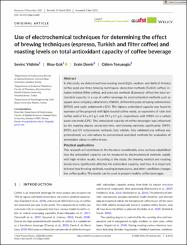Use of electrochemical techniques for determining the effect of brewing techniques (espresso, Turkish and filter coffee) and roasting levels on total antioxidant capacity of coffee beverage

Göster/
Erişim
info:eu-repo/semantics/embargoedAccessTarih
11.04.2022Üst veri
Tüm öğe kaydını gösterKünye
Yildirim, S., Demir, E., Gok, I., & Tokusoglu, O. (2022). Use of electrochemical techniques for determining the effect of brewing techniques (Espresso, Turkish and Filter coffee) and roasting levels on total antioxidant capacity of coffee beverage. Journal of Food Processing and Preservation, e16626.Özet
In this study, we determined how roasting levels (light, medium, and dark) of Arabica coffee seed and three brewing techniques—decoction methods (Turkish coffee), infusion method (filter coffee), and pressure methods (Espresso)—affect the total antioxidant capacity in a cup of coffee beverage by electrochemical methods such as square wave stripping voltammetry (SWSV), differential pulse stripping voltammetry (DPSV), and cyclic voltammetry (CV). The highest antioxidant capacity was found in espresso coffee prepared with light roasted coffee seeds, as equivalent of rutin and caffeic acid at 9.4 ± 0.2 g/L and 19.7 ± 0.7 g/L, respectively with SWSV on a carbon paste electrode (CPE). The antioxidant capacity of coffee beverages was influenced by the roasting degree, extraction time, and brewing methods, significantly. SWSV, DPSV, and CV voltammetric methods, fast, reliable, fully validated and without any pretreatment, are alternatives to conventional analytical methods for evaluation of antioxidant values in coffee brews.















